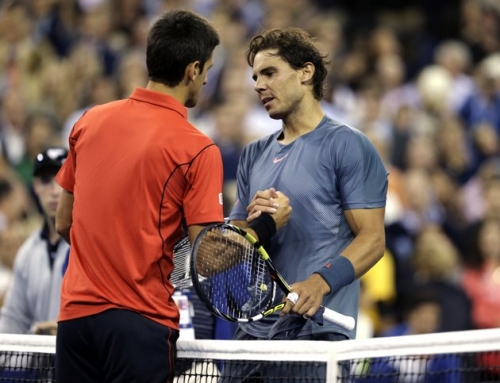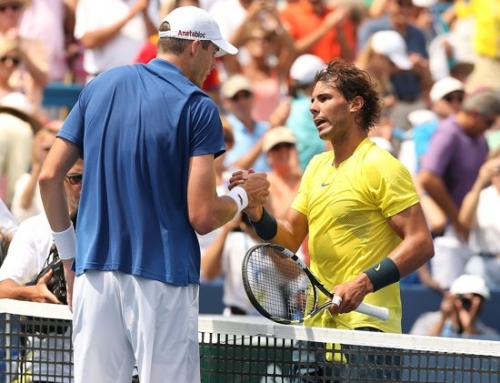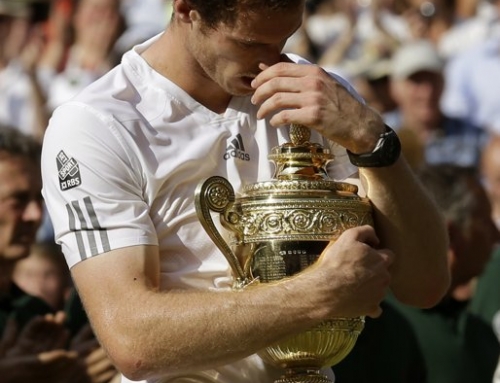 I managed to watch about a set of the finals of Barcelona between Nadal and Ferrer. For some reason, Tennis Channel opted to show it tape delayed even though it showed earlier rounds live.
I managed to watch about a set of the finals of Barcelona between Nadal and Ferrer. For some reason, Tennis Channel opted to show it tape delayed even though it showed earlier rounds live.
I knew Nadal had won the first set comfortably, and I knew Ferrer was up a break in the second based on scores on my phone.
What I didn’t know what that he was up 2-love with a break in the second. Ferrer took a lot of effort to hold his serve, but then broke twice to get a 4-2 lead. He was then down 0-40 on his own serve, but managed to get to deuce, then got broken anyway.
Most players have an idea how to play Nadal. Be aggressive, take your chances, and hope you can make a lot of shots in a row. It’s a daunting task. Often, if Nadal is upset, it’s because his opponent is serving well and he is making errors. Nadal typically has to contribute to his own defeat. To be fair, most players go through these kinds of slumps.
If you watched tennis in the 1980s, you would discover the week after a player had a good tournament, they would lose early in the next tournament. Why? One reason is the mental and physical effort to just win a tournament. Not everyone is a champ. Most players, even very good players, lose within a round or two. Only rarely do the chips fall right and they go deep into a tournament.
Mostly players, even very good players, lose. And often.
But even beyond that, many players didn’t feel the need to push themselves to win tournament after tournament. An early loss usually means the player didn’t feel like competing, and wanted the early rest. Sampras was famous for doing this. The Williams sisters do this even more often. If you’re injury prone, but very talented, it makes little sense to expend your best effort in small tournaments. Sure, the fans paid for you to see your best, but in the end, they forget which matches they went to, and you’re remembered for your Slam victories.
To that end, Nadal, for the most part, tends to try pretty hard every tournament he plays. He’s on such a roll that Nadal rarely loses more than a handful of games, so he can play lots of tournaments without the kind of wear and tear that he used to have when he was far more defensive.
Ferrer is as good as anyone on clay. He pressures his opponent. He runs around his backhand. He tries to attack.
But this is where Nadal is so tough. Nadal can often play a very solid defensive shot. It goes up the line sharply rather than weakly, and all of a sudden, a point that Ferrer was very much in control of, he’s now struggling to keep in the point, and once that point turns, Nadal attacks, taking the ball from one sideline to the other. Indeed, Nadal played Barcelona more aggressive than he played Monte Carlo which is key against Ferrer.
Meanwhile, Ferrer has to be on the attack all the time, and if he has a mental lapse, he can lose serve and be down a break. Nadal’s neutral shot are often good enough that it’s hard to attack. Nadal moves so quickly that even when you attack his “weak” shot, he often gets the ball back and solidly too. Meanwhile, Nadal punishes you for your weak shots. It’s not to say you can’t attack Nadal, but he makes you hit 2-3 shots more than you want to, and this can lead to errors.
Ferrer had his chances. He could have pushed this match to a third set, but Nadal is so relentless that it’s hard to sustain that kind of brilliance. The problem is few players hit a regular shot that hurts Nadal enough. Nadal chases down shots so well that even a hard hit shots comes back with some pace and spin, and that’s enough for Nadal not to be put on the defensive. And Nadal is always looking to take control of a point, something many players don’t do. They are content just getting in rallies and waiting for the error (say, Roddick).
Right now, the current thinking is the only guy who can beat Nadal on clay is Novak Djokovic. Djokovic has certainly been his toughest challenger in past years, but his record is about as dismal as Federer’s. Like Federer, Djokovic plays Nadal close, but doesn’t get the win.
Plus Djokovic is coming off an injury and has yet to play on clay this season. He’ll get a nice tournament to try to maintain his winning ways: Belgrade. This is his home tournament. The field is generally pretty weak. Typically, there isn’t another top 10 player playing. During this tournament, Federer, Nadal, and Murray are all taking time off to rest/practice. Soderling will play Estoril as the top seed and it will be his first tournament. Apparently, he was injured and was not 100% playing Barcelona.
All the top seeds return in Madrid the following week, then they all head to Rome before getting a week off for Paris.
One key question is how Federer is doing. At times, you see changes in his game that seem like it will help him beat a player like Nadal, but then you see frustrating shanks, and unforced errors. Right now, Federer hasn’t shown he has the weapons to beat players like Nadal and Djokovic and without the ability to beat one or the other, the French will remain elusive. This is quite the turnaround because Federer dominated Djokovic in 2010 beating him 4 of 5 times.
Right now, Nadal looks like the man to beat, at least on clay, but Djokovic is close, and Murray has the skills to keep in it. and possibly some player will play well at the French. In 2009, that man was Robin Soderling. In 2010, that man was Jurgen Melzer (who beat Ferrer and eventually ended up in the top 10).
That goes to show you that form sometimes doesn’t translate to deep Slam runs. Outside of Nadal, the top players heading into the French last year was David Ferrer, Fernando Verdasco, and maybe Ernests Gulbis. Verdasco lost to Almagro, Ferrer to Melzer, and Gulbis got injured and lost in the first round.
No one expected Melzer to make a deep run and beat Djokovic along the way, just like no one expected Soderling to beat Nadal and make it to the finals (and then beat Federer last year and make the finals again).
Indeed, Soderling hasn’t played all that well heading into the French in 2009 and 2010. Soderling did reach the finals of Barcelona, but his best result was the French. Admittedly, it’s tough to win clay events when Rafa is playing.
Well, that wasn’t all about the Barcelona final. I think we’re all waiting to see whether Djokovic can beat Rafa on clay or not. He had the tools two years ago, but couldn’t quite do it (even reaching match point at Madrid).
Does he have it this year?




![[US Open Men’s Final] Can Djokovic beat Nadal in the finals?](https://www.essentialtennis.com/wp-content/uploads/2013/09/20130909djokovic-500x383.jpg)


![[French Open] The tactics of the Djokovic-Nadal semifinals](https://www.essentialtennis.com/wp-content/uploads/2013/06/20130607nole-500x383.jpg)